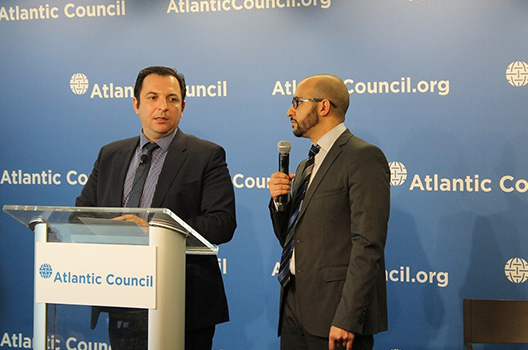On April 15, 2016, the Atlantic Council’s Rafik Hariri Center for the Middle East hosted a discussion with prominent Syrian media activist Mazen Darwish on the “Freedom of Expression in Syria.” Hariri Center Acting Director, Mirette Mabrouk, moderated the discussion.
Darwish opened with remarks on the upcoming Geneva peace talks and the issues of political transition, accountability, and justice. He posed several questions that the talks have yet to answer in terms of finding a comprehensive solution to the conflict: Is there going to be real accountability for all perpetrators of crimes against humanity? Is there going to be a reasonable solution for the Kurdish issue—and would that partition or divide the country? Is reconciliation possible for all Syrian communities after the pain and horror inflicted in the country? And will extremists be contained including the Islamic State (ISIS or ISIL), the Nusra Front, and others—or will this be an open-ended conflict?
In his remarks, Darwish commented on the fragmentation of the political negotiations, highlighting that the Geneva talks avoid central issues and do not recognize the unethical choice Syrians are given between ISIS and the Assad regime. He acknowledged that the topic of protecting minorities is currently prevalent in the media—and stressed that that while it is an important issue—accountability and protection must be attained for all Syrians. According to Darwish, democracy in Syria can stabilize the Middle East and the rest of the world. He ended his opening comments calling for a Marshall plan addressing both economic and political issues as well as human rights violations in order to secure the future of Syria.
During the discussion, Darwish explained that Bashar al-Assad’s assumption of power in 2001 was the turning point for freedoms in Syria. Since then, peaceful demonstrations for reforms such as allowing the release of detainees, the removal of emergency law, and freedom of expression were silenced. Often these demonstrations were met with arrests and beatings, and in March 2011 these acts of protests were met with bullets. Darwish said the Syrian constitution protects freedom of expression. Nonetheless, the regime justified restrictions on such freedoms in the name of protecting the state from terrorism under an emergency law clause.
In response to a question on the recent Alawite statement, Darwish noted the real fear of the Alawite community in avoiding a Shia-enforced lifestyle much different from their own. He praised the statement in theory but went on to say it is not enough, is not representative of all Alawites in Syria, and came at the cost of half a million Syrian lives. Darwish also said Kurdish tensions with both Turks and the Arabs could derail the Kurds’ right to be involved in the political process.
Darwish ended the discussion emphasizing the importance of a transitional government and justice in the future of Syria. He stated that securing democracy, freedom, and dignity is the duty of all Syrians regardless of party, president, or regime in power. Above all, a social contract among all Syrians will guarantee the rights for all and a solution for Syria. He stressed the solution cannot be a political decision outside or inside Syria; it must be a contract and the will of the Syrian majority. Darwish acknowledged that Russia is dictating to the Syrian people how to move forward, but is not working towards securing the state’s national interests. Darwish concluded by saying that as a Syrian, he hopes that this negotiation process is the will of the Syrian people and not that of John Kerry and Sergei Lavrov.
